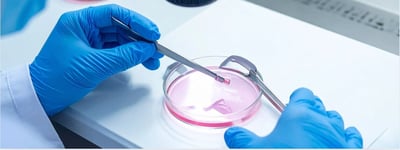.jpg)
1 December 2023
How to prepare your body for IVF
Embarking on a fertility journey can be both a hopeful and challenging experience. and being in your best possible health will certainly help. Your body will face a few more challenges with IVF treatment medication aimed at boosting egg release and later creating the right environment for embryo implantation and a full-term pregnancy.
Diet can play an influential role when starting IVF treatment. Dr Divya Manglam, nutritional therapist at Harley Street Fertility Clinic offers practical tips and insights to empower individuals starting IVF treatment.
Pre-conception: Prepare your body for IVF
We need to make sure there are no underlying factors that could be affecting your ability to conceive, so the following factors are addressed:
- Balancing hormone levels: this is especially important if you have PCOS, diabetes or thyroid issues. Your fertility specialist will work provide you with guidance on known deficiencies. Individuals with PCOS may be advised to focus on a low-glycemic diet to manage insulin levels, while those with thyroid issues may benefit from iodine-rich foods like seaweed
- Addressing nutritional deficiencies: A nutritional assessment will identify deficiencies that may affect reproductive health resulting in a personalized dietary plans. For instance, incorporating foods rich in folate, such as leafy greens and legumes can support foetal development and reduce the risk of neural tube defects.
- Eliminating any signs of toxic overload: Detoxification protocols may involve avoiding processed foods, alcohol, and caffeine, whilst increasing the consumption of organic fruits and vegetables. Specific foods like cruciferous vegetables (broccoli, kale) support liver detoxification processes.
- Improving the health and quality of the eggs and sperm: Dr Manglam encourages a nutrient-dense diet, including sources of omega-3 fatty acids (found in salmon, chia seeds) and antioxidants (found in berries, nuts). To increase sperm quality, coenzyme Q10 supplements may be recommended. The life of an egg and sperm are three months, so focusing on diet 3 months prior to treatment will get your body in peak physical shape.
- Minimising stress levels: Stress-reducing foods, like those rich in magnesium (dark chocolate, leafy greens) can reduce exposure to endocrine-disrupting chemicals to support emotional well-being.
- Boosting blood flow to the uterus: Foods high in arginine (nuts, seeds) to promote blood vessel dilation are recommended.
- Proteins help with follicle growth. Dr Manglam recommends 20 g of protein at each meal that can improve both egg and sperm quality. Lentils, chickpeas, red meat, seeds and nuts are all excellent sources of protein.
- Physical activity plays a very important role in fertility. Exercise plans, incorporating activities like brisk walking or yoga, are tailored to enhance cardiovascular health and blood circulation to the uterus.
- Improving the implantation environment: Ensuring a good thick uterine lining facilitates the fertilised egg to embed and implant. Foods rich in iron, such as lean meats and leafy greens, contribute to optimal blood flow and thickness. Hydration is also emphasized as it plays a crucial role in maintaining uterine health. Consuming water-rich foods, like watermelon and cucumber, complements the intake of fluids.
In conclusion, embarking on a fertility journey brings a mix of hope and challenges, and optimizing health is paramount for success. Dr. Divya Manglam's holistic approach, addressing factors such as hormonal balance, nutritional deficiencies, and stress reduction through personalized dietary plans, not only prepares the body for IVF but also enhances the quality of eggs and sperm, offering individuals the best possible foundation for a successful fertility journey.
.jpg?upsize=true&upscale=true&width=400&height=200&name=Untitled%20design%20(1).jpg)

